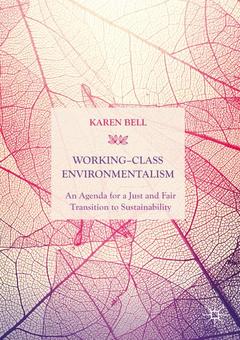Working-Class Environmentalism, 1st ed. 2020 An Agenda for a Just and Fair Transition to Sustainability
Auteur : Bell Karen

This book presents a timely perspective that puts working-class people at the forefront of achieving sustainability.
Bell argues that environmentalism is a class issue, and confronts some current practice, policy and research that is preventing the attainment of sustainability and a healthy environment for all. She combines two of the biggest challenges facing humanity: that millions of people around the world still do not have their social and environmental needs met (including healthy food, clean water, affordable energy, clean air); and that the earth?s resources have been over-used or misused.
Bell explores various solutions to these social and ecological crises and lays out an agenda for simultaneously achieving greater well-being, equality and sustainability. The result will be an invaluable resource for practitioners and policy-makers working to achieve environmental and social justice, as well as to students and scholars across social policy, sociology, human geography, and environmental studies.
1. Introduction: Environmental Classism.- 2. Class and Classism.- 3. Carrying the Environmental Burdens.- 4. The Environmental Policy Makers.- 5. The Environmental Policy Influencers.- 6. Working-Class Environmentalism.- 7. Explaining Environmental Classism?.- 8. Supporting Working-Class Environmentalism.
Karen Bell is Senior Lecturer in Geography and Environment at the University of West England, UK.
Presents solutions for developing green transitions which benefit, include and respect working-class people
Argues that working class people tend to carry the environmental burdens for society; are excluded from and alienated by traditional forms of environmentalism; are sometimes negatively impacted by environmental policy; are, and continue to be, environmentalists
Challenges current practice, policy and thinking by highlighting how discriminatory and undermining actions and attitudes towards working-class people are preventing the attainment of sustainability
Date de parution : 01-2020
Ouvrage de 292 p.
14.8x21 cm
Disponible chez l'éditeur (délai d'approvisionnement : 15 jours).
Prix indicatif 31,64 €
Ajouter au panier